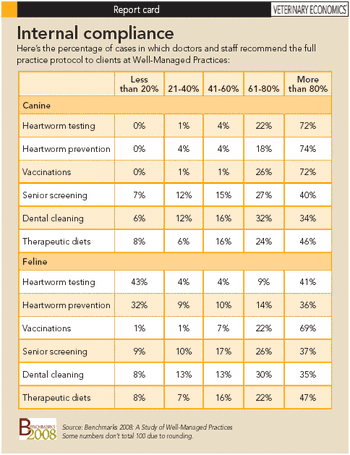
Improve client compliance with these hooks.

Improve client compliance with these hooks.

Stillwater, Okla. -- The Oklahoma State University Foundation received a $225,000 grant from Novartis Animal Health for laboratory renovations and start-up costs for the National Center for Veterinary Parasitology.

Feline heartworm is more prevalent than once believed, and cats likely face more damage from juvenile heartworms than from adult worms. Within two to three months, juvenile worms can cause serious pulmonary disease in cats, known as heartworm-associated respiratory disease (HARD). Compounding this dangerous threat is the fact that neither antibody nor antigen tests can accurately detect HARD.

Fleas and ticks are still a threat in cold winter months, so be sure your clients are informed.

Stress the importance of year-round protection.

Recently, veterinary parasitologist and flea expert, Dr. Michael Dryden, met with a veterinary dermatologist and two progressive practitioners to discuss the concerns and misconceptions that clients, staff, and veterinarians have about flea control-and to come up with clear solutions for the perplexing problems surrounding this issue.

Q. How worried should I be about Baylisascaris procyonis infection in dogs? In which geographic regions is it most prevalent?

Strategic deworming programs were developed for Ostertagia problems in cattle, and are of limited use with Haemonchus infestations in small ruminants.

Although sheep and goats get numerous types of parasites, Haemonchus contortus is the most important nematode and most significant parasite with respect to anthelmintic resistance, and will be the focus of this discussion.

Bartonella henselae is the primary etiologic agent in Cat Scratch Disease, which causes fever and lymphadenopathy in humans.

Information on common parasites such as roundworms, ascarids, hookworms, whipworms, and tapeworms.

The latest information on ehrlichiosis, anaplasmosis, Lyme disease, Rocky Mountain spotted fever, cytauxzoonosis, babesiosis, hepatozoonosis, and bartonellosis.

Information on roundworms, ascarids, hookworms, tapeworms, giardiasis, cryptosporidiosis, and toxoplasmosis.

The latest information on demodicosis, scabies, otoacariasis, cheyletiellosis, and cat fur mites.

In this presentation we will discuss the various groupings of parasites seen infesting reptiles & amphibians, how to identify them and thoughts on proper treatment to rid the hosts of these parasites.

The latest information on giardiasis, coccidiosis, neosporosis, and trichomoniasis.

Canine and feline heartworm diagnostic, treatment and prevention strategies have changed during the previous decade.

Classic signs of anemia include lethargy, weakness, inappetence, pale mucous membranes or icteric membranes if hemolysis is occurring.

Officials say better management practices could prevent the spread of equine piroplasmosis (EP).

If your client and internal compliance is just average-or worse-jump to the head of the class with these tips.

Gonzales, Texas -- A new state poultry diagnostic laboratory building will expand its current testing capacities thanks to a gift from its former director.

Bradenton, Fla. -- A sixth horse tested positive for equine piroplasmosis (EP), this one on a second Manatee County property, the Florida Department of Agriculture and Consumer Services (DOACS) reported.

Bradenton, Fla. -- State officials quarantined a Manatee County property where five cases of equine piroplasmosis (EP), a disease not reported in the United States since 1988, were confirmed.

Test your knowledge of external parasites with this short quiz.

Controlling tick infestations is important not only because ticks are nuisance parasites of dogs and cats, but also because they are vectors of a variety of bacterial and protozoal diseases.